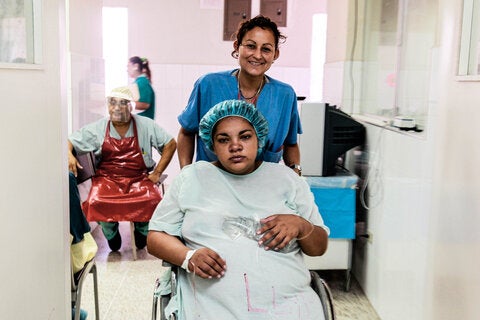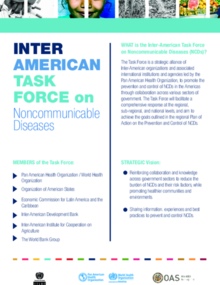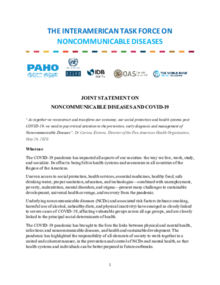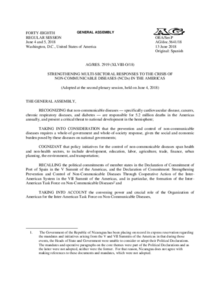What is the Inter-American Task Force on NCDs?
The Task Force is a strategic alliance of Inter-American organizations and associated international institutions and agencies led by the Pan American Health Organization, to promote the prevention and control of NCDs in the Americas through collaboration across various sectors of government. The Task Force will facilitate a comprehensive response at the regional, sub-regional, and national levels, and aim to achieve the goals outlined in the regional Plan of Action on the Prevention and Control of NCDs 2013-2019.
The Inter-American Task Force on NCDs aims to:
- Align the relevant NCD activities of individual Inter-American organizations and associated international institutions and agencies to support Member States in implementing actions to prevent and control NCDs.
- Harmonize interagency efforts to strengthen the national capacities for NCD policies and programs, within the mandates of the individual agencies of the Task Force.
- Facilitate the optimal deployment of resources, collaboration, networking, and exchange of information among the organizations of the Inter-American system and associated international institutions and agencies to support Member States in the prevention and control of NCDs.
- Coordinate the regional multisector NCD actions with related global initiatives, to ensure complementarity of purpose and optimal use of resources, and to contribute to the NCD-related targets included within the Sustainable Development Goals (SDGs).
Strategic vision
- Reinforcing collaboration and knowledge across government sectors to reduce the burden of NCDs and their risk factors, while promoting healthier communities and environments.
- Sharing information. experiences and best practices to prevent and control NCDs.

Why is it important
In the Americas, NCDs are responsible for 5.2 million deaths each year, and hundreds of millions more live with an NCD and require on-going care. NCDs have a debilitating impact on individuals, labor force, health systems, and social and economic development. NCDs can be prevented if all stakeholders take part in creating multi-sectoral policies and programs to promote health and to improve health care. This Task Force brings together the capacity and expertise of partner organizations working with different government sectors to reduce the burden of NCDs in the Region of the Americas.
Events
- Understanding the Economic dimension of NCDs and tools to effectively address them (11 September 2019)
- OAS General Assembly approved a resolution to strengthen multi-sectoral response to NCDs in the Americas (4-5 June 2018)
- PAHO Director calls for greater political commitment to reduce the burden of noncommunicable diseases (19 March 2018)
- Launch of the Inter-American Task Force on Noncommunicable Diseases (17 June 2015)

JOINT STATEMENT ON NONCOMMUNICABLE DISEASES AND COVID-19
" As together we reconstruct and transform our economy, our social protection and health systems post COVID-19, we need to pay critical attention to the prevention, early diagnosis and management of Noncommunicable Diseases”. Dr Carissa Etienne, Director of the Pan American Health Organization, May 26, 2020.
Whereas:
The COVID-19 pandemic has impacted all aspects of our societies: the way we live, work, study, and socialize. Its effect is being felt in health systems and economies in all countries of the Region of the Americas.
Uneven access to social protection, health services, essential medicines, healthy food, safe drinking water, proper sanitation, education, and technologies—combined with unemployment, poverty, malnutrition, mental disorders, and stigma—present many challenges to sustainable development, universal health coverage, and recovery from the pandemic.
Underlying noncommunicable diseases (NCDs) and associated risk factors (tobacco smoking, harmful use of alcohol, unhealthy diets, and physical inactivity) have emerged as closely linked to severe cases of COVID-19, affecting vulnerable groups across all age groups, and are closely linked to the principal social determinants of health.
The COVID-19 pandemic has brought to the fore the links between physical and mental health, infectious and noncommunicable diseases, and health and sustainable development. The pandemic has highlighted the responsibility of all elements of society to work together in a united and coherent manner, in the prevention and control of NCDs and mental health, so that health systems and individuals can be better prepared in future outbreaks.
Cost-effective solutions exist for the prevention and control of NCDs. However, slow action by countries in the Region to implement these interventions is now contributing to the COVID-19 pandemic, and may lead to long-term consequences if existing policies are further weakened.
Effective action on NCDs requires a multisectoral approach across all government sectors—as well as civil society—not only for policy implementation and enforcement, but also for generating the necessary political will to support risk factor reduction measures. Such measures usually face strong opposition from industries involved in the manufacture, marketing, distribution, and sale of harmful products such as tobacco, alcohol, sugar-sweetened beverages, and ultraprocessed foods.
The members of the InterAmerican Task Force (IATF) on NCDs pledge to renew and strengthen their efforts to promote intersectoral and interagency dialogue and cooperation towards fiscal, economic, and health policy coherence in response to the COVID-19 pandemic and in the post- pandemic recovery phase.
The IATF will work jointly, and in a complementary manner, in the prevention and control of NCDs and their risk factors to promote policies and interventions that support health-in-all- policies across the lifespan—with equity—while reinforcing the role of health as an essential component of human capital.
Therefore, the IATF on NCDs will work together to implement measures that:
- Highlight the adverse impact of NCDs and their risk factors on the achievement of the United Nations Sustainable Development Goals, considering the added challenges posed by the COVID-19 pandemic, and promote policies and interventions to achieve these global goals.
- Promote multisectoral engagement within the scope of work of the IATF member Agencies and Organizations to respond to COVID-19, and in the post-pandemic period, to strengthen NCD risk factor policies and improve the health system response for NCDs.
- Foster policy and regulatory interventions in support of health protection, reduction of NCD risk factors, and health care services that are equitable, accessible, and affordable.
- Advocate for sustainable, health-promoting food systems in the post COVID-19 regional and national responses.
- Encourage the use of taxes to reduce health risks, build better health systems, and help finance COVID-19 recovery efforts.
14 September 2020
Policy briefs: what government ministries need to know about noncommunicable diseases
These policy briefs provide government decision makers with information about how NCDs affect their sector, as well as the steps they can take to respond to the challenge of NCDs.
These briefs will enable ministries to:
- Implement the 2030 Agenda for Sustainable Development, including strengthened implementation of the World Health Organization Framework Convention on Tobacco Control;
- Recognize that NCDs present a major challenge to their sector and the national development agenda;
- Identify concrete steps that can be taken in their sector to tackle NCDs;
- Implement commitments agreed in the 2011 UN Political Declaration and 2014 UN Outcome Document on NCDs;
- Enact the WHO Global NCD Action Plan 2013-2020, in particular the set of very cost-effective and affordable interventions for all countries, and policy options to promote a whole-of-government and whole-of-society response to reducing risk factors and enabling health systems to respond.






























